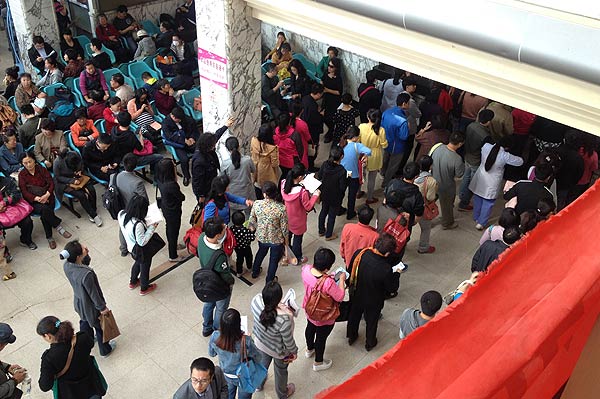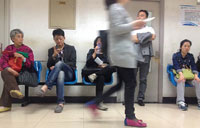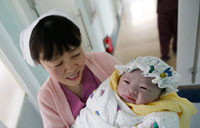 |
|
People queue up to register at the Beijing Obstetrics and Gynecology Hospital, April 22. [Photo/chinadaily.com.cn] |
|
 Labor and birth |
|
 Babies bloom in propitious years of the Chinese zodiac |
Xi Shuyan, an official from the city's health and family planning commission in charge of maternal and child health management, said last week that the commission issued a circular recently, advising capable hospitals to reserve more beds for pregnant women with critical health conditions. Healthy pregnant women will need to go to other medical institutions, she said.
Experts believe the city will see a baby boom in the near future after the local government began allowing parents to have a second child if either parent is an only child.
An additional 270,000 babies will be born in the city in the next five years due to the new policy, the commission estimated in February.
City hospitals, whose obstetric wards are already overcrowded, are bracing for the challenge.
"The number of outpatients in our obstetrics department has been increasing by 20 percent annually in recent years, hitting more than 80,000 people last year. This year the number is going to be even greater," said Zhang Fuchun, assistant president of Peking University Third Hospital.
The city's health and family planning commission recommended that all pregnant women go to local healthcare providers to establish a personal profile before they register in a hospital for maternal checks and childbirth.
Xi said the city is going to establish a system to monitor how many pregnant women the hospitals are receiving and will pass on such information to local healthcare providers. These providers can then direct the pregnant women to hospitals that have vacant beds.
"We hope by sharing such information, pregnant women won't have to rush from hospital to hospital in order to get admitted," she said.
Local healthcare providers will also conduct preliminary screenings for pregnant women, and, based on the result of the screenings, advise them in choosing a hospital.
"If the screening shows that a woman faces very high risks during pregnancy or is not suitable to give birth, she will be transferred to a hospital designated to treat high-risk pregnancies or other top level hospitals," said Xi.
"Otherwise, grassroots medical workers will advise her to avoid top level hospitals, which are already overcrowded."
C-section, middle age play into 2nd child decision
Chongqing resident Su Shu, 35, went for a pre-pregnancy test in March when local media reported that the city was about to allow some couples to have a second child.
Her test results were fine except for a low blood sugar reading. But Su, the mother of an 8-year-old, is wavering over having another child.
"The doctor told me that women at my age should go for tests every two weeks after being pregnant for three months and should undergo an amniotic fluid test because the risk of a fetal anomaly is higher than for younger women," Su said.
"But I would like to have a second child as my son is too lonely."
Su, an only child herself, is one of the Chinese women who are finding it hard to decide if they want to make use of the new second-child policy being implemented by some provinces. Couples may have a second child if one partner is an only child.
